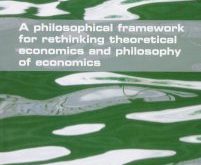from Lars Syll Veblen, Keynes, and Hirschman were more than economists because they practiced their economics from a standpoint outside the profession, using it to criticize not only the assumption of rational self-interest, but also the consequences of economists’ indifference to “preferences.” Veblen’s standpoint was explicitly religious; he was still of a believing generation. Keynes, too, was an ethicist. G.E. Moore’s Principia Ethica remained what he called his “religion under the...
Read More »Pixies and economic theory
from Ken Zimmerman (originally a comment) When I was 12 and my sister 5 she was convinced that pixies lived in our backyard and protected our house from the coyotes, raccoons, and bobcats that were a problem for city neighborhoods all over Texas due to the drought. I tried to convince her otherwise but couldn’t. I agreed to go with her every night before her bedtime to search for the pixies. Never found them and by the time my sister began the new school year she had forgotten about...
Read More »Weekend Read – Imagine if stopping climate change was more important than making climate change billionaires
from Dean Baker We are still getting through a worldwide pandemic that has taken tens of millions of lives. While we did develop effective vaccines, they were not produced and distributed quickly enough to prevent enormous loss of life. This is a tragedy that should force us to ask how we could have done better. On the other side, some people did manage to get enormously rich from the pandemic. Specifically, those who had patent monopolies on the mRNA vaccines did very well, as the stock...
Read More »The feminist building-blocks of a just, sustainable economy
from Jayati Ghosh Feminist economists have long argued that the purpose of an economy is to support the survival and flourishing of life, in all its forms. This may seem obvious but it turns on its head the prevailing view, which implicitly assumes the opposite causation: the economy runs according to its own laws, which must be respected by mere human actors. In this market-fundamentalist perspective, it is a potential angry god which can deliver prosperity or devastation and must be...
Read More »Let’s Clear Up the Corporate Disinformation Around Infrastructure, Shall We? Dean Baker Joins
Julianna welcomes back recurring guest Dean Baker, Macroeconomist and co-founder of the Center for Economic and Policy Research, to discuss how the continued media disinformation around the BBB Act and reconciliation bill, and the economic effects of both, has been staggering. For example, how earlier this week Representative Malliotakis of Staten Island was on the news giving credit to Trump for laying the groundwork for the infrastructure bill that just passed. Insane! Dean Baker...
Read More »actNOW with Julianna Forlano: When & How The Economy Will Feel The Infrastructure Bill w/ Dean Baker
WHEN WILL WE FEEL THE EFFECTS OF THE INFRASTRUCTURE BILL? Julianna and economist Dean Baker talk media disinformation around the BBBA and about how and when Biden’s economic policies will be felt by everyday people. There’s some bad news and good news in there. We also discuss the supply chain issues. Dean even tells us what to do to win out in this new car/used car atmosphere! ——— act.tv is a progressive media company specializing in next generation live...
Read More »Rethinking economics
from Lars Syll The incorporation of new information makes sense only if the future is to be similar to the past. Any kind of empirical test, whatever form it adopts, will not make sense, however, if the world is uncertain because in such a world induction does not work. Past experience is not a useful guide to guess the future in these conditions (it only serves when the future, somehow, is already implicit in the present) … I believe the only way to use past experience is to assume that...
Read More »The media discover real wages
from Dean Baker Those of us who have spent decades trying to call attention to the situation of ordinary workers, and their stagnant wages over the last four decades, are glad to see the media’s newfound interest in real wages (the difference between wage growth and price growth). They have been anxious to highlight the fact that inflation has exceeded the rate of wage growth over the last year. While that is unfortunate, it is also the case that this is not unusual. Here’s the picture...
Read More »Black cats in dark rooms
from Ken Zimmerman (originally a comment) At least part of the problem here is that these economists seem to have made up a way of doing science that exists nowhere else. To be sure their way existed once among some at or shortly after the beginning of science in Europe. Scientists are depicted as patiently piecing together a giant puzzle. But with a puzzle you see the manufacturer has guaranteed there is a solution. Certainly not the case with the work of scientists. This view remains...
Read More »Polluters adore net zero targets
from Yanis Varoufakis It [capitalism] has always gained pace through the incessant commodification of everything, beginning with land, labour and technology before spreading to genetically modified organisms, and even a woman’s womb or an asteroid. As capitalism’s realm spread, price-less goods turned into pricey commodities. The owners of the machinery and the land necessary for the commodification of goods profited, while everyone else progressed from the wretchedness of the 19th...
Read More » Real-World Economics Review
Real-World Economics Review





